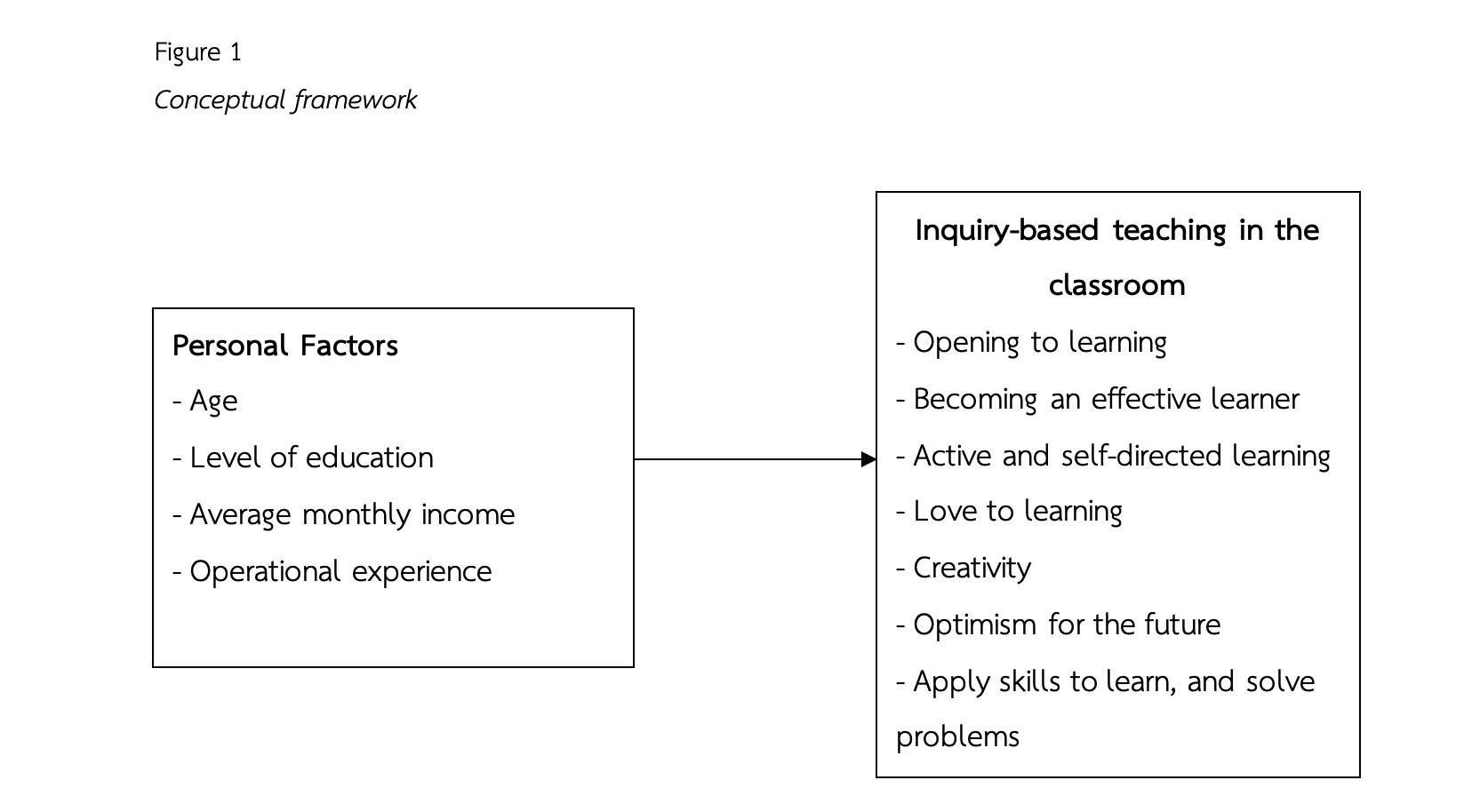FACTORS INFLUENCING TEACHING PERFORMANCE IN HONGQI MIDDLE SCHOOL: AN APPLICATION OF INQUIRY-BASED TEACHING MODE IN CLASSROOM TEACHING
Main Article Content
บทคัดย่อ
This research aims to study the level of inquiry-based teaching in the classroom and to compare inquiry-based teaching in the classroom classified by personal factors. The population of teachers in junior middle school is 71. The sample consisted of 60 teachers at Hongqi Middle School and used a simple random sampling method. Data was collected through a questionnaire, and data analysis was performed using descriptive statistics, including frequency, percentage, mean, and standard deviation. And hypothesis testing used a t-test and an F-test at a statistical significance level of.05.
The results showed that:
Personal attribute factors such as age and operational experience can influence teaching performance using inquiry-based teaching differently. It affects inquiry-based teaching in the classroom in the field of opening to learning differently at the statistically significant .01 and .00 levels, respectively. Respondents aged 21–30 years old had different opinions on inquiry-based teaching in the classroom compared to respondents aged between 31–40 and 41–50 years old. In terms of operational experience, respondents with a long time to work can have different opinions on inquiry-based teaching in the classroom. Respondents with working experience under 5 years will be different from those with 5–10 years and more than 10 years or more.
Article Details
เอกสารอ้างอิง
Aldeman, C. (2018). The impact of salary increases on teacher recruitment and retention: Evidence from a natural experiment. Education Finance and Policy, 13(3), 200-223.
Benekos, P. J. (2016). How to be a good teacher: Passion, person, and pedagogy. Journal of Criminal Justice Education, 27(2), 225-237.
Cascio, E. U. (2021). Early childhood education in the United States: What, when, where, who, how, and why. National Bureau of Economic Research.
Chen, C. Y. C., Byrne, E., & Vélez, T. (2022). Impact of the 2020 pandemic of COVID-19 on families with school-aged children in the United States: Roles of income level and race. Journal of Family Issues, 43(3), 719-740.
Cho, H. J., Zhao, K., Lee, C. R., Runshe, D., & Krousgrill, C. (2021). Active learning through flipped classroom in mechanical engineering: improving students’ perception of learning and performance. International Journal of STEM Education, 8(6), 1-13.
Cho, W., & Appleton, J. J. (2019). Longitudinal associations between teacher and school characteristics and their perceptions, and student outcomes: Multilevel multivariate meta-analysis. Review of Educational Research, 8(5), 717-760.
Deák, C., Kumar, B., Szabó, I., Nagy, G., & Szentesi, S. (2021). Evolution of new approaches in pedagogy and STEM with inquiry-based learning and post-pandemic scenarios. Education Sciences, 11(7), 319.
Guo, L., Huang, J., & Zhang, Y. (2019). Education development in China: Education return, quality, and equity. Sustainability, 11(13), 3750.
Hailikari, T., Virtanen, V., Vesalainen, M., & Postareff, L. (2022). Student perspectives on how different elements of constructive alignment support active learning. Active Learning in Higher Education, 23(3), 217-231.
Huang, X., Chin-Hsi, L., Mingyao, S., & Peng, X. (2021). What drives teaching for creativity? Dynamic componential modelling of the school environment, teacher enthusiasm, and metacognition. Teaching and Teacher Education, 107, 103491.
Kwon, K. A., Ford, T. G., Salvatore, A. L., Randall, K., Jeon, L., Malek-Lasater, A., ... & Han, M. (2020). Neglected elements of a high-quality early childhood workforce: Whole teacher well-being and working conditions. Early Childhood Education Journal, 50, 157-168.
Lestiyanawati, R. (2020). The strategies and problems faced by Indonesian teachers in conducting e-learning during COVID-19 outbreak. CLLiENT (Culture, Literature, Linguistics, and English Teaching), 2(1), 71-82.
Rehorek, S. J. (2004). Inquiry-based teaching. The American Biology Teacher, 66(7), 493-499.
Rusnac, S., & Roșciupchin, D. (2023). The influence of social and demographic characteristics on modern students’ self-confidence and assertiveness. Revista de Cercetare si Interventie Sociala, 81, 7-24.
Seneviratne, K., Hamid, J. A., Khatibi, A., Azam, F., & Sudasinghe, S. (2019). Multi-faceted professional development designs for science teachers’ self-efficacy for inquiry-based teaching: a critical review. Universal Journal of Educational Research, 7(7), 1595-1611.
Sun, S. Y., & Peng, L. H. (2020). Study of the virtual reality education and digitalization in China. Journal of Physics: Conference Series, 14(1), 1-7.
Teig, N., Scherer, R., & Nilsen, T. (2018). More isn't always better: The curvilinear relationship between inquiry-based teaching and student achievement in science. Learning and instruction, 5(6), 20-29.
Wang, Y., & Guan, H. (2020). Exploring demotivation factors of Chinese learners of English as a foreign language based on positive psychology. Revista Argentina de Clinica Psicologica, 29(1), 851-861.
Wei, P. (2022). The impact of social support on students' mental health: A new perspective based on fine art majors. Frontiers in Psychology, 1(3), 41-57.
Xiaoling, P., & Xuan, Z. (2022, May). The transformation of artificial intelligence in the 5G era and the impact on education. In 2022 IEEE 2nd International Conference on Electronic Technology, Communication and Information (ICETCI) (pp. 903-907). IEEE.
Xue, Q., Xie, X., Liu, Q., Zhou, Y., Zhu, K., Wu, H., ... & Song, R. (2021). Knowledge, attitudes, and practices towards COVID-19 among primary school students in Hubei Province, China. Children and youth services review, 1(20), 105735.
Zhang, X., Admiraal, W., & Saab, N. (2021). Teachers’ motivation to participate in continuous professional development: relationship with factors at the personal and school level. Journal of Education for Teaching, 47(5), 714-731.


